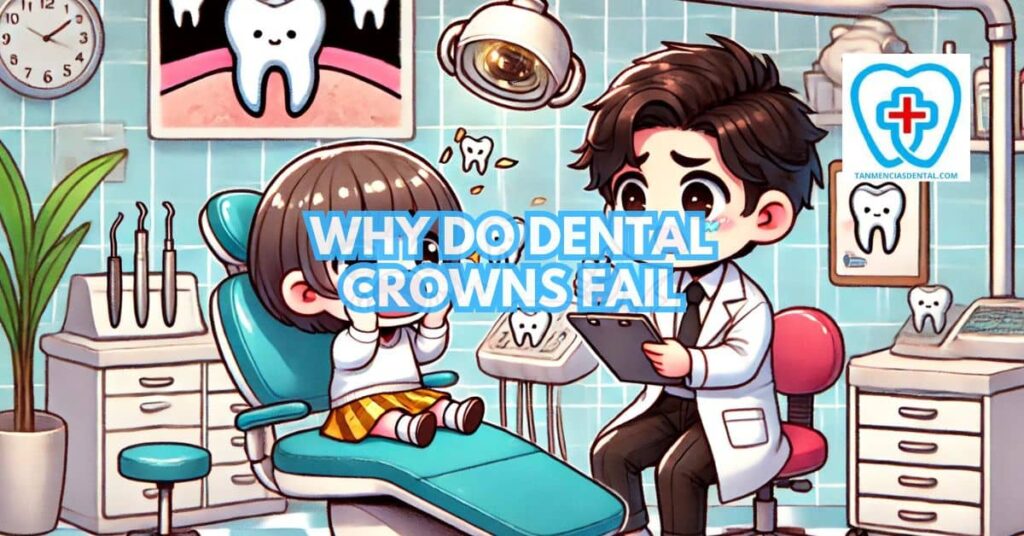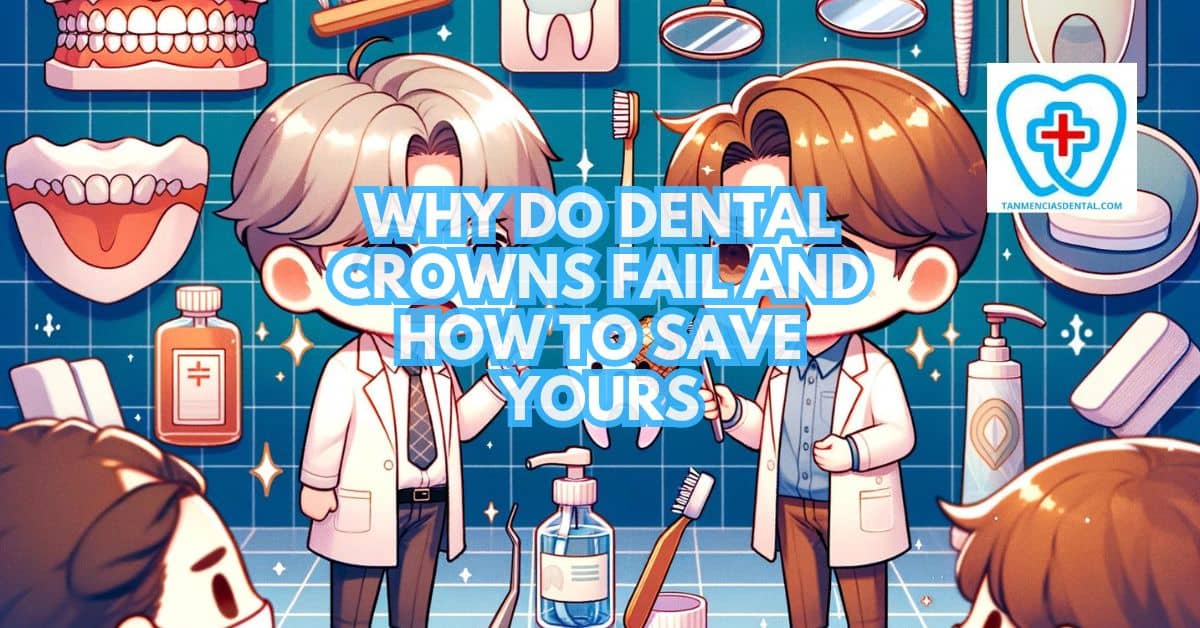Dental crowns are an effective solution for restoring damaged teeth, but they are not indestructible.
Many people wonder, “Why do dental crowns fail?” and the truth is, several factors contribute to their breakdown.
Poor oral hygiene, daily wear and tear, and improper placement can all lead to failure over time.
Recognizing early warning signs and taking preventive steps can help extend the life of your crown.
We’ll explore the common reasons for dental crown failure and practical ways to protect your investment in a healthy smile.
1. Beyond the Chipped Smile: Different Types of Dental Crown Failure
A tooth crown can fail for several reasons, including fractures, gradual wear, or an improper fit.
Fractures often happen when people bite down on hard foods like ice or accidentally hit their teeth.
Over time, constant chewing and grinding can wear down a crown, making it weaker and more likely to break.
If a crown is damaged, it may no longer protect the tooth underneath, leaving it exposed to bacteria.
An improper fit can create small spaces where food and plaque get trapped, increasing the risk of tooth decay.
Decay under a crown can lead to pain, infection, or even the need for a root canal.
Regular dental checkups help catch these problems early, allowing for repairs or replacements before serious damage occurs.
🦷 The Importance of Dental Implant Abutments for Long-Term Oral Health
2. The Silent Culprits: Unveiling Common Causes of Crown Failure
Poor oral hygiene, teeth grinding, and dietary habits are common causes of crown failure.
Neglecting oral hygiene can lead to decay under the crown.
Grinding your teeth can cause cracks or dislodge the crown.
Eating hard or sticky foods puts extra stress on the crown.
Identifying and addressing these causes can prolong the life of your crown.
🦷 Essential Dental Care Tips for Children: Boost Your Child’s Smile
3. Warning Signs: When Your Crown Might Be in Distress
Pain, sensitivity, and visible cracks are signs that your crown might be failing.
If a crown starts to come loose, it may no longer fit properly, allowing bacteria to enter and cause infection.
Persistent pain around the crown area could mean the tooth underneath is damaged or decayed.
Sensitivity to hot or cold foods might indicate that the protective seal between the crown and tooth is weakening.
Visible cracks or chips can weaken the structure, increasing the risk of breakage.
Ignoring these signs can lead to serious dental health issues, such as infections or tooth loss.
In many cases, the best solution is to replace the crown before the problem worsens.
🦷 Why Selecting the Right Abutments for Dental Implants Is Key to Lasting Results
4. Don’t Delay, Seek Help: Why Early Intervention Is Key
Promptly addressing dental crown issues is crucial for avoiding further damage.
Delaying treatment can lead to more complex and expensive procedures.
Early intervention can often save the existing crown, preventing the need for replacement.
Immediate action reduces the risk of infections and additional tooth damage.
Regular dental checkups can catch problems early, ensuring timely treatment.
🦷 Why Some People Experience Pain During Dental Cleanings and Others Don’t

5. Second Chances: Can You Save a Failing Crown?
Many failing crowns can be repaired if treated early.
If a crown starts to become loose, a dentist may be able to re-cement it before further damage occurs.
Small cracks or chips in an old crown can sometimes be smoothed or patched to extend its lifespan.
However, if the crown is severely worn down or no longer fits properly, it may need to be replaced.
A new crown provides better protection and restores the function of the tooth.
Ignoring a failing crown can lead to infection or damage to the tooth underneath.
Regular dental checkups help detect problems early, increasing the chances of saving or replacing a crown before serious issues develop.
🦷 Is It Safe to Brush My Teeth After a Teeth Whitening Treatment?
6. Prevention is Key: Habits to Extend the Life of Your Crown
Maintaining good oral hygiene is essential for the longevity of dental crowns.
Brush and floss regularly to prevent decay around the crown.
Avoid biting hard objects and limit consumption of sticky foods.
Use a night guard if you grind your teeth.
Regular dental visits ensure any potential problems are caught and addressed early.
🦷 What to Expect When Getting Teeth Whitening Services in the Philippines
7. How Long Will My Crown Last? Understanding Crown Lifespan
Dental crowns typically last between 5 and 15 years, but their longevity depends on several factors.
Poor dental hygiene can lead to plaque buildup around the crown, increasing the risk of decay or infection.
As time passes, a loose crown may develop due to daily wear, teeth grinding, or changes in the shape of the underlying tooth.
If a crown no longer fits properly, it can trap food and bacteria, which may cause discomfort or lead to further dental issues.
Regular checkups allow your dentist to monitor the crown’s condition and make necessary adjustments before serious problems arise.
Choosing the right material, such as porcelain or metal, can also affect how long a crown lasts.
Maintaining good oral care habits, like brushing, flossing, and avoiding hard foods, helps protect both your crown and the tooth underneath.
🦷 Why Dental Implants with Bridges Offer the Best Solution for Missing Teeth
8. Choosing the Right Crown Material
Different crown materials perform differently over time.
Some materials, like metal, tend to last longer than porcelain.
Zirconia crowns are strong and can resist wear better than some other options.
Each material has its rate of failure depending on how it is used.
Your dentist can help you choose the best material for your smile.
🦷 Periodontal Surgery in Marikina: Combining Local Expertise with Global Standards
9. Crowns vs. Alternatives: Exploring Other Dental Repair Options
In some cases, dental crowns might not be the best solution for tooth repair.
Alternatives like veneers, inlays, or onlays could be more suitable depending on the damage and location of the tooth.
Veneers cover the front surface of the tooth, while inlays and onlays fit into the tooth’s structure.
Each option has its advantages and limitations.
Discussing these alternatives with your dentist helps you make an informed decision that best suits your dental needs.
🦷 How Brushing After Whitening Can Help Maintain a Radiant Smile
10. Cost Considerations: What to Expect When Repairing or Replacing a Crown
Repairing or replacing a dental crown can be costly, with prices varying based on the material and complexity of the procedure.
Porcelain crowns tend to be more expensive than metal or composite crowns.
Insurance may cover part of the cost, but out-of-pocket expenses can still be significant.
Understanding the potential costs upfront helps with financial planning and avoiding surprises.
Speaking with your dentist about payment options can also help you save money.
🦷 Is Teeth Whitening Safe While Breastfeeding?
11. A Smile that Lasts: The Importance of Oral Care for Crown Health
Consistent oral care is crucial for maintaining the health of your dental crowns.
Regular brushing, flossing, and dental visits keep your mouth healthy and prevent issues that can affect your crowns.
Using fluoride toothpaste helps protect the underlying tooth structure.
Avoiding habits that stress the crown, like chewing ice, further ensures its longevity.
Good oral hygiene practices are key to a lasting smile and the durability of your crowns.
🦷 Reliable Dental Experts in Marikina
👨⚕️ Conclusion
Understanding why dental crowns fail and how to prevent these failures is vital for protecting your investment.
Regular maintenance, early intervention, and good oral hygiene can extend the life of your crowns.
Being proactive in your dental care prevents costly and complex treatments in the future.
With proper care, you can ensure your crowns remain functional and aesthetically pleasing for years.
Investing time and effort in oral health pays off with a beautiful, lasting smile.
😊 Self-Promotion
Visit Tan-Mencias Dental Clinic in Parang, Marikina City, for top-notch dental care in a friendly and welcoming environment.
Our team is dedicated to ensuring your smile is healthy and beautiful.
For any questions or to schedule an appointment, you can call us at 9171451074, message us through our Facebook page, or use our website’s contact form.
We are here to provide you with the best dental care and address all your concerns.
Come and experience the difference at Tan-Mencias Dental Clinic!

